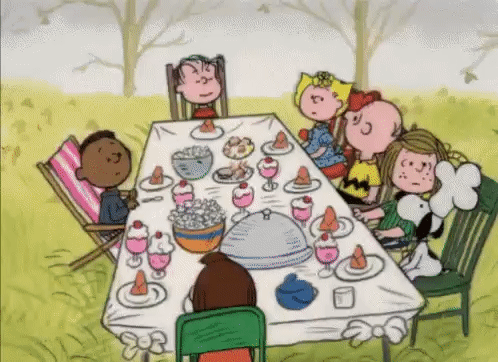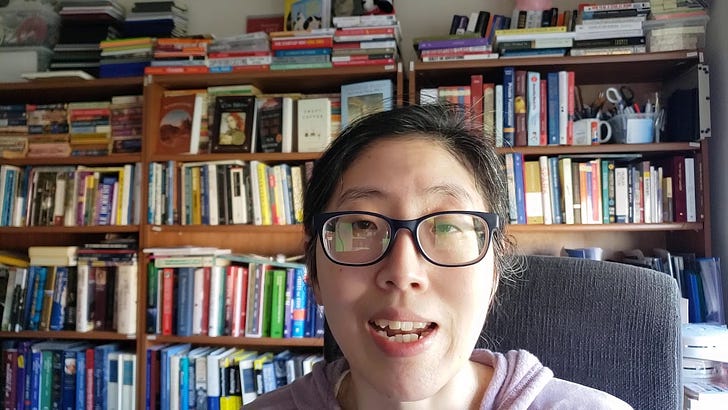Trade-offs and Triumphs 17 by @jennykim
Issue 17: Smaller Gatherings and Practicing Your Intro; Making Time for Play; Calling People In
Hello, friends! Thank you to my 90 subscribers, and welcome to my new subscribers!
Welcome to issue 17!
How was your week? What were your trade-offs and triumphs?
To those celebrating the Thanksgiving holiday this week, Happy Thanksgiving! 👪🦃
For those who want a primer on what issue 17 is about - play this almost 4-minute YouTube video, produced courtesy of a Minimum Viable Video assignment.
For those who would like to read on…
💡 Smaller Birds, Smaller Gatherings, and Practicing Your Intro
💡 Push Aside the Food - Let’s Make Time for Play
💡 Finally, Calling People In
Smaller Birds, Smaller Gatherings, and Practicing Your Intro
This year, Thanksgiving is probably a little different for most of us. Past traditions of exceedingly large turkeys, side dishes, and desserts may be put on pause as we all try to adhere to smaller gatherings. Instead, there may be smaller turkeys or no turkeys at all, more distinctive side dishes, and desserts that may not be the traditional pumpkin pie.

As for desserts, what about chocolate chip cookies? Check out “The best homemade chocolate chip cookies” recipe thanks to Charlie Bleecker. And consume those cookies with milk, or a nice hot cup of Noowave coffee…
Or, if none of these are options, then as Tom Reid reminds us during #NostalgiaChat, there is always “Thanksgiving in a can”:


Whatever your food options are, over a small gathering is the perfect time to test out your “perfect introduction”:

In her blog, Julia Saxena breaks down the simple formula to great introductions about what you do provided courtesy of Clay Hebert via a Performative Speaking course:
The formula is: I help people [verb] their [noun].
When you say “I help,” your intro automatically isn’t about you anymore. You’re telling them how you help someone achieve a result.
The next step is to make it more specific. Who exactly do you help?
When you’re meeting someone, ask them first what they do. Once you know that, you can better tailor your intro to them.
Let’s take it one step further. Substitute “help” with a stronger verb.
Push Aside the Food - Let’s Make Time for Play
Let’s face it - when you were a kid, you thought that sitting at the kid’s table was punishment. The adults had better food and their conversation was more interesting.
Or, so you thought - until you graduated to the adult table, and then realized that things were so much better at the kid’s table.


You wrinkled your nose as you listened to the adults “pretend” how great and accomplished they were, and how they made fun of others who were not as well-off. The knowing smirks. The careful touching of the crystal as they sipped wine.
There was no such pretense at the kid’s table. If one of your cousins thought that what you did was ugly, she said so. And if you wanted to punch your cousin’s arm, you did.

As you meet at your small gatherings, perfect your intro, be grateful for who you are. And don’t hide behind what the world wants you to be.
Don’t let the world define you - COVID19 should be the moment everyone defines him or herself.
And if you need help “chiseling and tightening” who you are and what you really want - check out ThirtyTenZero.
Finally, Calling People In
Finally, take a moment during this Thanksgiving to take a deep breath and to manage your emotions. And, instead of calling people out on what you perceive to be their narrow mindedness, “call them in.”
Be inspired by the work of Professor Loretta J. Ross at Smith College - she wants all of us to focus on “conversation, compassion, and context.” She identifies the key differences between “calling out” and “calling in”:
Calling out assumes the worst. Calling in involves conversation, compassion and context. It doesn’t mean a person should ignore harm, slight or damage, but nor should she, he or they exaggerate it. “Every time somebody disagrees with me it’s not ‘verbal violence.’” Professor Ross said. “I’m not getting ‘re-raped.’ Overstatement of harm is not helpful when you’re trying to create a culture of compassion.”
And how do you “call in”?
Calling in is like calling out, but done privately and with respect. “It’s a call out done with love,” she said. That may mean simply sending someone a private message, or even ringing them on the telephone (!) to discuss the matter, or simply taking a breath before commenting, screen-shotting or demanding one “do better” without explaining how.
In action, Nisha Anand did a great of “calling in” when she started to collaborate with conservatives to advance criminal justice reform. To learn how she did it, watch her TED Talk, “The Radical Act of Choosing Common Ground.”
Have any questions or comments? You can find me on Twitter @jennykim or email me at jennykimwop@gmail.com
Check out my website for more: puttingittogether.blog
No lie as a trade-off is ever worth the temporary illusion of triumph. Keep on cultivating that rubber ball heart.
And, find that trade-off that will lead to triumph this week, no matter how small, and celebrate it.
See you next week!





